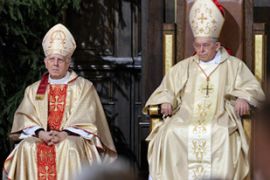Polish priest to expose clergy
Poland’s Catholic church can expect more scandals as Polish priest speaks out.

Isakowicz-Zaleski, who says he wants the Catholic church to admit its failings during the communism period, said on Thursday: “The whole tragedy is that the church had 16 years to take care of the problem, and it didn’t do a thing.
“For many faithful the problem is not that a priest collaborated. If he were to admit it and ask for forgiveness the issue would be closed. The problem is that there is a conviction that the church is hiding a difficult problem, and the hiding is the worst part.”
Now, church leaders are bracing for Isakowicz-Zaleski’s book – due out soon – about the secret police’s penetration of the church in Krakow.
Scandal
The widening scandal threatens to tarnish the Polish church, whose resistance to the Communist leadership was perhaps best personified by John Paul II, the former archbishop of Krakow. His encouragement of peaceful challenge to the regime is credited by many with hastening its demise in 1989.
But part of the church’s reluctance to tackle the issue loops back to the Polish-born pontiff, Isakowicz-Zaleski says: “Some said that as long as the pope is alive, you can’t smear him. They said the Holy Father did so much for Poland, and so you shouldn’t reveal agents so as not to cause any unpleasantness.”
| “Some said that as long as the pope is alive, you can’t smear him. They said the Holy Father did so much for Poland, and so you shouldn’t reveal agents so as not to cause any unpleasantness” Reverend Tadeusz Isakowicz-Zaleski |
He points to the fact that the first allegations of collaboration against a Polish priest surface in late April 2005 – three weeks after John Paul’s death.
Historians with the Institute of National Remembrance (IPN), which holds the secret police archives, say priests were the most persecuted group in communist Poland. Of the some 25,000 clergy in the country, 10-15 per cent are commonly estimated by church officials and historians to have cooperated with the security agencies.
Secret police agents not only spied on the church, they also murdered a charismatic Warsaw priest tied to Solidarity, the Reverend Jerzy Popieluszko, in 1984.
A year later, Isakowicz-Zaleski himself was twice beaten – once in April, once in December – by “unknown assailants … but it was a known fact they were secret police agents,” he said.
Cover up
For many years, church leaders underestimated the problem, believing the assurances they received from General Czeslaw Kiszczak, an interior minister in the communist regime, that the secret police had destroyed all the files on the church. Microfilm copies survived, however, and were later used to help bring down Wielgus.
Isakowicz-Zaleski says he told his superiors of what he found in his file, but “nobody wanted to listen.”
“When the bomb exploded January 7 with Wielgus, it turned out I was right,” he said.
He has clashed with the church hierarchy over his upcoming book, which looks set to be the next major revelation of compromised clergy.
Last year, Cardinal Stanislaw Dziwisz temporarily ordered Isakowicz-Zaleski not to speak with the press; Poland’s primate, Cardinal Jozef Glemp, publicly criticised him, accusing him of “sniffing around and tracking down priests to add to his book.”